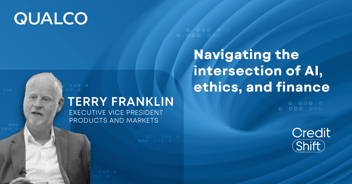QUALCO at the 14th NPL Europe Conference in London
QUALCO |
QUALCO joined the 14th NPL Europe Conference, an event dedicated to the European Non-Performing Loans (NPL) market, bringing together leading executives overseeing NPL disposals, prominent servicers, investors, and advisors. SmithNovak, renowned for organising premier events in the non-performing loans market across Europe, hosted the event on March 6-7 in London, UK.
Terry Franklin, EVP of Products & Markets at QUALCO, joined a panel discussion centred around Artificial Intelligence (AI) & Technology, along with Mark Oppermann (Webio), Hardev Tumber (Revolut) and Javier Morilla (Diglo). The panellists discussed the difficulties that banks and servicers face in adopting efficient technology in recovery processes, Blockchain Technology's role in NPL transactions, and maximising Big Data use. They shared insights into the future of technology - driven NPL management and emphasised AI's importance in due diligence, asset portfolio review and predictive modelling. The speakers explored the emerging uses of generative AI in the industry, and shared strategies for benefiting from analytics.
QUALCO's Approach to AI Technology
Franklin highlighted that although machine learning and neural networks have existed for a long time, today, the emphasis is on utilising these technologies for more efficient operations. He shed light on how QUALCO:
- Uses AI for segmentation, delving into customer behaviours, and customising treatments accordingly. Developing propensity models helps determine optimal contact channels, timing, preferred conversation channels, and potential financial considerations. This segmentation is fundamental, enabling differentiated customer treatments.
- Applies AI technology in document summarisation. Analysing historical archives allows documents to be condensed into easily digestible formats, enhancing user accessibility. With customer service agents swiftly summarising notes during calls, conversations are streamlined.
- Analyses customer behaviours to unveil patterns. Real-time analysis of voice or conversational messaging interactions helps identify triggers, facilitating task assignment. By recognising and modelling these behaviours, we enhance our ability to address them, optimising operations.

Explore four real-life use cases on how AI revolutionises debt management and experience the difference AI can make for collections.
"AI IS HERE TO STAY.
THE IMPORTANT THING IS HOW YOU GET THE BEST VALUE OUT OF IT."
Navigating the Challenges of AI Application
In discussing anticipated AI application regulations, Franklin emphasised the ongoing substantial investment in technology and the lack of overarching incentives to hinder that progress. Meanwhile, he underscored the importance of ensuring fair outcomes and employing sound data practices. This requires knowledgeable individuals to guide model development and make recommendations to improve effectiveness.
He also highlighted the challenge presented by legacy systems, emphasising the importance of integrated data for model building. A unified strategy is essential for seizing opportunities, particularly cost-saving, amid tight financial markets. By leveraging analytics and AI, decision-making can be enhanced, aligning with evolving trends towards efficiency and value extraction. He also stressed the importance of coherence and alignment in deploying models throughout the customer journey. A transformative approach, supported by a well-defined strategy, is vital for end customers to capitalise on such initiatives fully.
"IF YOU BUILD MODELS ON BAD DATA, YOU'RE GOING TO GET BAD OUTCOMES."
Spotlight on Chatbot Technology
Franklin expects natural language processing to evolve in the following years, with individuals seamlessly interacting with their devices to automate tasks like setting up payments. However, achieving this level of automation may still be a distant goal due to system alignment challenges. Banks are already becoming more selective in their services. The collections industry will focus on identifying customers for rehabilitation, using technology to segment them correctly and ease their return to financial order.
Regarding customer communication, Franklin pointed out that younger generations expect digital interactions over speaking to agents, preferring chatbots for their customer journeys. The end customers' demand differs from thirty years ago, with technology now dominating acquisition and management processes. Chatbot technology is expected to explode, moving beyond rules-based systems to AI-driven interactions that offer better experiences. AI models can provide better quality interactions than agents without the risk of fatigue or disinterest. Ultimately, this could lead to cost savings and enable human resources to focus on complex cases requiring human interaction.
"YOU STILL NEED PEOPLE, AND I THINK ,PEOPLE AND AI TOGETHER WILL BE
THE MOST EFFECTIVE WAY TO USE AI IN ANY BUSINESS."
Lastly, Franklin explained that there is a variety of techniques that can be applied to ensure unbiased analytical models. While purchasing pre-built models from tech giants relies on their testing, it's crucial to acknowledge inherent biases. Methodologies exist to tackle biases by ensuring the right datasets, applying corrective techniques, and implementing those effectively.




